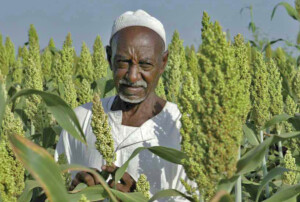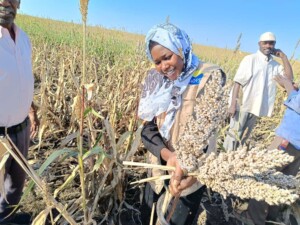Several separate protests in North and South Darfur are demanding action from local authorities over financial aid issues, tribal leaders, and agricultural crop failure as the region continues to suffer from growing acute food insecurity, recent flooding, and mass displacement.
On Sunday, the local resistance committees of El Kuma in North Darfur organised a sit-in in front of the local municipality, demanding the exit of the Sudanese Red Crescent, including the executive director, from the locality.
Ibrahim Omar Redar, the coordinator of the resistance committees, accused the Red Crescent of excluding eight neighborhoods from financial support by the World Food Program.
Sadig Ahmed Manzil, the head of a resistance committee, appealed to the government to implement their demands within 72 hours. The committee threatened to completely block the Western Salvation Road and hold a procession to the building of the state government secretariat if their demands are not met.
Protesters of El Sereif locality in North Darfur state continued the sit-in at the local headquarters for a fourth week, as the residents of the state reject the state governor’s recent decision to appoint a Beni Hussein tribal leader. The protesters demand the dismissal of the executive director and a number of other officials of the locality.
Residents told Radio Dabanga that Brigadier General Dhafer, commander of the 21st Brigade in Kabkabiya, visited the sit-in last week to ask the protestors to open the doors of the locality. They explained that the new executive director of the locality, Ibrahim Ismail Nasreddin, has not yet been able to begin working due to the sit-in, despite his arrival last week.
The people have also accused the North Darfur authorities of violating an earlier agreement concerning the appointment of native administration leaders, in particular concerning nazirs*. The agreement stipulates that each tribe should hold a conference to choose its nazir, and that they should not be appointed by state authorities.
On Sunday, farmers in Ed El Fursan in South Darfur closed the road between Nyala and Ed El Fursan to protest the Ministry of Agriculture's failure to respond to their repeated demands to combat pests in the region.
Pests, especially starlings, have significantly affected the agricultural season in South Darfur, according to farmer Naser Hussein Barra. The farmers informed the ministry that they were being affected by pests several times last month. Barra said that spraying aircraft were supposed to arrive to combat the issue yesterday, but the planes were sent to Ed Daein in East Darfur instead.
“The authorities have broken their promise,” Barra told Radio Dabanga. The farmers confirmed that they will continue to close the road until their demands are met.
“The authorities have broken their promise.” – Naser Hussein Barra, South Darfur farmer
Last week, farmers in Mellit, Um Keddada, El Taweisha and El Laeit in North Darfur complained about the spread of bugs that feed on millet, threatening the failure of the entire agricultural season. Farmers told Radio Dabanga that they are fighting the pest without any official participation from the government.
The report owed Sudan’s deteriorating macroeconomic situation to “political instability, persistent low foreign currency reserves, high inflation rates, and the depreciation of the SDG”. FEWS NET also attributed the government’s raised taxes on “agricultural products, port fees, industry, and trade”, as a further constraint on Sudan’s household purchasing power.
* A nazir is a state-appointed administrative chief of a clan, according to the native administration system in Sudan. An emir is the head of a tribe.
 Resistance committees hold protest in Darfur in August 2020 (social media)
Resistance committees hold protest in Darfur in August 2020 (social media)










 and then
and then